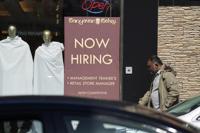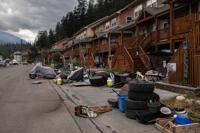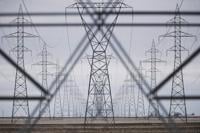OTTAWA - The parliamentary secretary for Finance Minister Chrystia Freeland is criticizing the parliamentary budget officer for not issuing a more-public correction to its carbon price analysis after finding an error in it.
The PBO published a note on its website on April 17 admitting its economic analyses of the consumer carbon price, done in both 2022 and 2023, erroneously included the impact of the industrial carbon price, too.
The PBO says it plans to publish an updated analysis in the fall.
Liberal MP and parliamentary secretary Ryan Turnbull said in a letter sent to PBO Yves Giroux on Tuesday that his office should have gone to greater lengths to ensure the public be notified of the error — and explain how it may have skewed the results.
"With great respect, correcting the record on your analysis of the fuel charge is necessary to maintain the integrity of your office," Turnbull wrote.
Turnbull said the PBO's mistake raises "significant questions" about the analysis, which he notes has been at the centre of political debates about the impact of carbon pricing.
"At a time when misinformation on carbon pricing is running rampant, this is deeply unfortunate, as your office has a well-earned reputation for non-partisan and rigorous analysis," he added.
The PBO's original analyses claimed that while most families would receive more from rebates than they paid in carbon pricing, those benefits would be erased once the impact on job growth and incomes was factored in.
The consumer carbon price, or what Ottawa calls the fuel charge, is applied to the price of fossil fuels people and smaller businesses and organizations, buy to run their cars, heat their homes or keep the lights on.
Big industrial emitters, more than 560 organizations and companies including oilsands, mines, automakers and natural gas power plants, don’t pay the carbon price on the fuel they buy to operate. Instead, they pay it on a portion of what they actually emit.
In an interview with Ďă¸ŰÁůşĎ˛ĘąŇĹĆ×ĘÁĎ, Giroux said the model used to estimate the economic costs of the fuel charge inadvertently included the industrial carbon price as well.
He dismissed the idea that the his office was not transparent enough about the error, highlighting the fact that a note was published on the website and a new analysis is going to be conducted.
Giroux said he doesn't expect the updated analysis to deviate significantly from the conclusions drawn last year about the economic impact of the consumer carbon price.
"We don't think it will change the nature of the findings," Giroux said. " So the overall conclusions of the reports will still remain for the economic side."
The federal Conservatives have frequently cited the PBO's work to support their argument that the consumer carbon price is leaving Canadian families financially worse off.
However, the report has been criticized for not considering the economic costs associated with climate change.
Turnbull echoed those concerns in his letter.
"Currently, (climate change costs) aren’t factored into your analysis at all, which does a disservice to supporting a more fulsome debate informed by a more holistic set of relevant facts and evidence," he said.
Asked whether the PBO has plans to incorporate climate change costs in the upcoming analysis, Giroux said no.
He said estimating the cost of climate change is tricky, especially when analyzing short-term impacts. Giroux also noted that his office is charged with costing federal policies, not conducting cost-benefit analyses.
However, he said his office will stress the fact that the costs of climate change are not included in the upcoming analysis.
"Our plan is to try to be clear about what this report, this upcoming report will do and what it doesn't do. For example, it doesn't say, or it's not meant to be interpreted that doing nothing is the best alternative scenario, or that's something that's even desirable," he said.
Other groups have analyzed the cost of climate change however. The Canadian Climate Institute said in a report in 2022 that all households will see a loss of income due to climate change.
The International Monetary Fund has warned that repeated impacts of severe weather can also wreak economic havoc.
This report by Ďă¸ŰÁůşĎ˛ĘąŇĹĆ×ĘÁĎ was first published May 28, 2024.








































